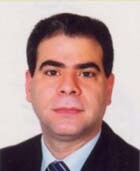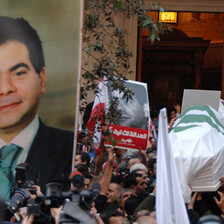Electronic Lebanon 22 November 2006

Pierre Gemayel
The murder of the minister of industry, shot in his car while returning from a suburban church, is very much in line with the recent killings of 15 political leaders and journalists, which culminated with the death of former prime minister Rafik Hariri in February 2005.
It is certainly no coincidence that Gemayel became the next victim on the very day the UN Security Council approved the formation of an international tribunal to prosecute the suspected murderers of Hariri. He is the fifth anti-Syrian figure to be killed in two yeas, and the first member of Prime Minister Fouad Siniora’s pro-western government to be eliminated.
Now, as with the previous executions, the eyes have turned towards the invisible hand of Damascus, the secret services of which are suspected to still be active in Lebanon.
Nevertheless, Lebanese officials go beyond suspicions. Lebanon’s acting Interior Minister Ahmed Fatkat openly blamed Syria for the assassination, while Samir Geagea, commander of the Christian Lebanese Forces Party, called on Lebanon’s pro-Syrian president Emil Lahoud to resign immediately. Geagea too accused Syria of masterminding the killing.
Amin Gemayel, the victim’s father and former president of Lebanon, and influential Druze leader Walid Jumblatt have exhorted the Christian community to remain calm. It is, however, unlikely that calm will prevail in the forthcoming weeks.
The signs of impending unrest were already sent last Sunday, when Hezbollah leader Sheikh Hassan Nasrallah threatened a wave of massive street protests aimed at bringing down the government if it ignores the group’s demand to form a national unity Cabinet that would give Hezbollah allies considerable influence and the power to block major decisions. Nasrallah accused Siniora’s government of being a puppet of the United States and described it as “illegitimate” and “unconstitutional.”
In spite of the immediate condemnation of the murder by the UN Security Council, the United States, the EU and numerous foreign countries including Syria and Iran, it does not seem that the case will soon be closed. Politics in Lebanon is unusually complex, and the implications of this terrorist act are difficult to fathom with accuracy at this moment.
Several scenarios can be worked out based on the country’s history, its socio-political fabric, regional geopolitical considerations, and its leaders’ personalities.
Although Syria is the “usual suspect” for political cleansing in Lebanon, other Middle Eastern powers could also benefit from a breakdown of the Lebanese status quo diverting attention from Iran’s nuclear programme, Iraq or the Palestinian issue.
Damascus, which on Tuesday signed accords with Baghdad to normalise the relationship between the two countries, may have more to lose than to gain from Pierre Gemayel’s brutal elimination, in spite of the latter’s efforts to undermine Syria’s credibility after its armed forces’ retreat from Lebanon.
Political life in Lebanon has consistently been driven by external factors, but its tragedies are the result of home grown politicians’ deeds. Leadership, outside of the Hezbollah, is weak. Fouad Siniora’s government has proven incapable to disarm the armed groups, the activities of which triggered the Israeli invasion of last summer — a crisis which the same government was inadequate to resolve without foreign intervention.
This has fuelled the expectations of both Muslim Shia and Sunni groups for completely seizing power in the short term.
At the same time, the Christian groups have lost the strength displayed during the civil war of 1975-1990. The Gemayel dynasty of Catholic Maronite leaders, although prominent and respected, is no stranger to this. Their policies have often been divisive, their methods of imposing their views sometimes ruthless, and their blindness to the aspirations of other religious sects astounding.
The movement of March 14, which confirmed the country’s emancipation from Syria’s 29- year domination, has created euphoria that may not be sustained much longer. Leadership is once more the reason.
The ruling bloc is disintegrating between assassinations and ministers’ resignations in recent months. The Christian opposition, led by former General Michel Aoun, hero of the civil war who returned from exile in May 2005, less than two weeks after the departure of the Syrian troops, is incoherent in its compromises with the Hezbollah.
The situation is further exacerbated by the presence of Emil Lahoud, President of the country, a firmly pro-Syrian retired officer and Aoun’s subordinate in the army, who is apparently determined to undermine the government’s alliance with the West, particularly the United States.
The most recent example is his opposition to the creation of the international court, which will investigate Hariri’s assassination. This is not surprising. A number of Syrian and Lebanese intelligence officers and the commander of the Presidential Guard are among the accused for the former premier’s murder.
Officially, however, the opposition to the formation of the international tribunal is based on legal grounds, as the Lebanese constitution requires approval of such action by both the President and the Prime Minister. Russia and Qatar promptly seized this technicality to delay implementation of the UN decision. The Security Council eventually accepted that it would become effective once the country’s presidency and government resolve their constitutional differences.
Since the Israeli invasion of last August, which proved the absence of the State from the country’s governance, the spectre of civil war hangs over Lebanon. The decision of the West to intervene, and U.S. President George W. Bush’s support to Siniora have kept the clouds in high altitude.
Christian and Muslim moderates keep repeating that the country will remain united, no matter what. However, Pierre Gemayel’s assassination, taken in the context of other current regional events and Hezbollah’s promises for civil unrest, may change the fragile balance in Lebanese politics.
An armed clash between the Lebanese Muslim and Christian communities is likely to have serious implications for the EU, the United States, and regional players. Turkey in particular, a secular Muslim state, whose peacekeeping troops are already in Lebanon, wants to stay out of inter-cultural conflicts at a time of crucial negotiations for joining the European Union.
Furthermore, increasing suspicion that the United States and Israel are supporting Pejak, the Iranian branch of PKK (Kurdistan’s Working Party, a revolutionary movement) to overthrow Tehran’s regime is likely to make Turkey revise its Middle Eastern policy. The possibility of such a plot is of great concern for Ankara because of its potential to fuel separatist claims by Turkish Kurds.
A civil war in Lebanon is also a mined field for France, because of its large Muslim population, and for the United States, currently trapped in a domestic war between religious factions in Iraq.
As so many important players have so much to lose, one can hope that peace would be preserved in Lebanon. Pierre Gemayel’s assassination was obviously planned to have serious regional effects, not just to silence an opponent to Syria’s meddling in local affairs.
All rights reserved, IPS – Inter Press Service. Total or partial publication, retransmission or sale forbidden.
Related Links


